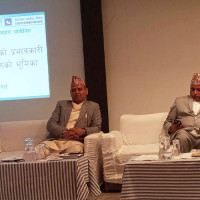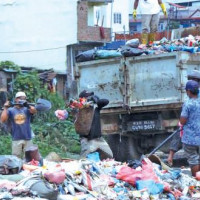- Saturday, 21 February 2026
Public Trust Key To Political Legitimacy
Legitimacy implies the lawful and just action of public authority with a positive outcome for the people and the latter’s voluntary acceptance. In a democracy, the government is required to use its power in the broader public interest so that people deem it beneficial and develop loyalty to it. Law must be reasonably crafted on the higher order of integrity, justice and morality and a new stage of freedom fostered by the information revolution. Now, legitimacy is derived from the public trust in the rationality of collaborative action. It is based on public opinion, elections and output of the government. It entails general approval of people, as popular sovereignty lies with them.
Legitimacy of political power is determined by how Nepalis get benefits from their authority and institutions. How political leadership acquires, uses and transfers information, resources, political power and authority to people and earns public faith is central to modern legitimacy. The digital platform has decentralised the awareness of people, stimulated them to use their rights and helped to realise popular sovereignty. Nepali constitutional outreach at the multi-layer rule is vital to their well-being.
Heroic deeds
The unifier of modern Nepal, Prithvi Narayan Shah, defined the code of legitimacy in Dibya Upadesh and the cultural spirit of the people. The Ranarchy derived its legitimacy from the Royal seal, custom, lineage, heroic deeds and ritualistic symbols. It evoked the notion of dharma embedded in the Muluki Ain, as a means of dispensing justice. Acceptance of authority out of fear of sheer force is characteristic of the ancien régime, lacking the democratic virtue of popular will. Public administration was confined to extracting taxes and creating security and order in society.
The pre-modern patrimonial authority of Ranas did not make a distinction between the public and the private sphere. The post-Rana regimes of democracy and Panchayat fused electoral legitimacy with patrimonial authority. Public administration in the constitutional state remained in the hands of specialists and experts recruited by the Public Service Commission through meritocratic competition, demonstrating neutrality in the delivery of public goods and services.
In a varied society like Nepal, customary legitimacy can serve as a source of political stability while the coherence of the state, polity, political parties and civil society is expected to achieve national goals and thwart parochial, tribal, feudal and post-modern forces drifting the nation into centrifugal course. They flag the output legitimacy of the Nepali polity. Now the political instability, partisan control of administration, frequent reshuffling of public servants, corruption, impunity and free free-riding role of interest groups have cramped legal-rational authority and provoked a revolt of Gen Z against ideological and leadership control of their lives, devoid of choice. It demands a new legitimacy based on freedom.
Many factors in Nepal have limped the existing legitimacy as people assert to negotiate rightful, powerful relations with changing times: First, party leaders of Nepal have mostly regime awareness. They therefore failed to play a role in building an interface between state sovereignty and popular sovereignty and cultivate national identity of citizenship across mini identities through civic education to outdo patronage. The constitutional tradition of politics was expected to spur social transformation.
But they appeared weak to erase the unwritten transcript of society based on caste, gender and economic prejudice and address the shortfall of output legitimacy where even the poor can relish democratic dividends. The Nepali constitution, hailed as a great progress in political life, turned a contested site for parties, thus boiling the despair, anguish and rage of the victims of the political order. Media spectacles detonate non-stop commotion about the state of the nation.
One may ask why none of Nepal’s governments emerged out of electoral or charismatic legitimacy and failed to run, fulfill tenure and achieve system stability. Obviously, the authority to rule requires not just procedures or input legitimacy but the effectiveness of governance to support the life, freedom and livelihood of people. The process of legitimacy is vital to shape the nation’s political culture and evade the penetration of the deep state, infecting the supply of public goods and services and eroding its culture’s ability to balance rivalry and cooperation.
The overall prosperity can meet the integrity of the national polity, compliance of Nepalis to the constitutional spirit and wisely coordinate their conduct. It averts atrophy in leaders' conduct and determines the government's right to rule. Nepali people voluntarily pay taxes to the state but the nexus of business and politics exempts huge taxes and revenue from the corporate sectors. The rent-seeking tendency of bureaucrats, the grand corruption of the political class, the rationalising tendency of partisan and commercial media and obsequious civil society have diluted the efficacy of the Nepali polity to perform fairly in the general public interest. The selective use of law without grounding in constitutionality affirms its impunity system.
The distribution of the posts of judges based on party quota, not on the basis of competency, fairness and integrity, hits the justice system and erodes legal-rational legitimacy. The antinomies of justice and law provide incentive for populist, radical and anti-system forces to act at their will. The historical pattern of Nepal’s regime change is rooted not in a lawful path but an extra-legal one, including the recent Gen Z revolt that unlocked possibilities for leadership change, party reforms and an end to the corruption and criminality of politics. Generational change is expected to make Nepali polity adaptable to changing times, driven by the ballast of digital platforms. The erosion of charismatic and legal-rational legitimacy underscores the need to define it beyond legal positivism.
Second, Nepalis' participation in national, sub-national and local elections is relatively high. So do their commitment to democratic values. But improvement in the judgmental ability of Nepali voters requires building their critical consciousness, cognitive ability and political skills to select competent and wise leaders. The skewed participation of people’s representatives in policy and decision-making has confiscated the autonomy of parliament and the cabinet and undisguised the deflation of the party system.
Entry of new forces into the political realm is precisely the reason for the growth of new legitimacy driven by digital space, which increased the outreach of information and made every Nepali analytical. The civic activism of people is growing. The lure of multiple agencies of connection and participation has offered new choices. By the sheer power of money, corporate sectors habitually occupy representational space and dominate the programme drafting of political parties and the government, while a critical mass of the public is denied and, therefore, bears no stake, ownership and trust in the political culture.
International regimes’ aid conditionality to policy and structural adjustment of the nation has further distorted national priorities and democratic communication, legitimacy and choice of people. This is one of the reasons Nepali people celebrate all regime change—democratic, despotic or anomic. The Gen Z revolt, electrified by information, has cathartic effects on young leaders of parties facing a seized mentality and expression of people’s emotions and feelings.
Third, stable distribution of power and responsibility in the polity and fair checks can restrain the abuse of power, authority and legitimacy. In Nepal, power and resources are unevenly distributed in society, while information is diffused, prompting people to use their sovereignty. It has questioned the winner-takes-all game, which promotes disloyal opposition and is less favourable to democratic zeal.
The abuse of the proportional election system, designed to democratise the base of political power and make parliament a mosaic of the entire nation, added impatient negativism. The growing anomie is the response to the defects of Ponzi politics. Public faith in public policies can grow if leaders produce better outcomes and inputs of those affected by the policy are included in decisions, thus bolstering communicative and collaborative legitimacy.
Fourth, the paltry moral ground of political leadership is the sign of the feeble institutionalization of political power in Nepal and the growth of a myriad of mini subcultures. Nepalis' relentless struggle for recognition, dignity and opportunity is affecting the performance of the polity. No institutional autonomy exists for the public admin, constitutional bodies, political parties, business, media and civil society. As a result, their functions are boundary-breaking of institutional dharma.
Nepali leaders’ art of rhetoric cannot improve legitimacy unless performance instills innovative policies and economic performance takes off to satisfy basic needs, investments in productive sectors for trade and commerce. Only then are decisions morally binding to all. Transparency of legitimacy is essential. It is not based on coercion or the use of force but on the wise advice of specialists aligned with online and offline expectations of Nepalis.
Varied perceptions
Nepalis express pride in their state but uphold varied perceptions on the polity, government, political parties, media, business and civil society. Democracy requires building trust in these civic bodies, which can coordinate the functions of security, regulating, disciplining, adjudicating and bureaucratic agencies for efficient output legitimacy. This means Nepali political parties must relish the traditional virtues of karma, the spirit of public philosophy to spur generalized social capital and social solidarity and rest their legitimacy on to digitally connected and transparent circulation of each generation into political power.
A freely-contested public sphere can revive moral virtues of integrative potential so far dampened by individualism, weakening of political life and ethical and material decay. Institutionalisation of authority in Nepal is essential as personalization of leadership has made legitimacy fleeting and transitional, incapable of harnessing the virtues of state-society coherence through mediating institutions and beating the enigmas of Nepali political life by building a national character of public-spirited citizens. Virtuous leadership consists of functioning as per the spirit of constitutional norms, moral values, national imperatives and the zeitgeist.
(Former Reader at the Department of Political Science, TU, Dahal writes on political and social issues.)






-original-thumb.jpg)








